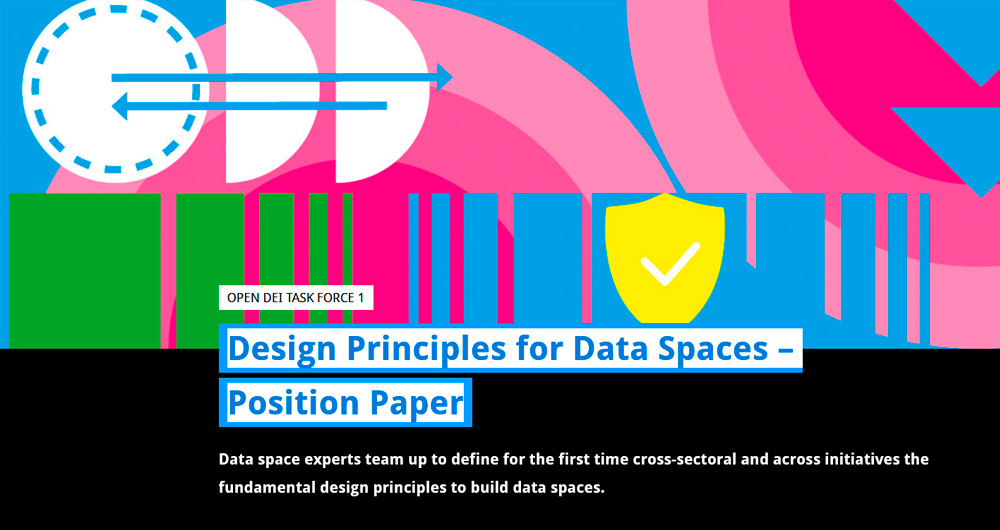European webinar on developments in the data spaces of the future
Fecha de la noticia: 19-05-2023

Open data is the highest level of data sharing, as it is freely available and accessible to all. Properly processed and with full respect for the protection of personal data, it can help citizens, businesses and the public sector to make better decisions.
Open data, together with other data, play a key role in the creation of data spaces, as referred to in the European Data Strategy. As stated in the document, the implementation of common and interoperable data spaces in strategic sectors is set up with the aim of "overcoming technical and legal barriers to data sharing between organisations, combining the necessary tools and infrastructures and addressing trust issues", for example through common standards developed for the space.
In view of its relevance, the European Data Portal Academy has organised a series of webinars on data spaces. The first of these was held on 12 May in an online format and can be viewed here. In it, the new developments and progress being made regarding data spaces were mentioned, developments that in Spain are being carried out by the Data Office.
We summarise below the main aspects addressed in this first seminar, in which Daniele Rizzi, Principal administrator and policy officer and Johan Bodenkamp, Policy and project officer at the Directorate General for Communication Networks, Content and Technologies of the European Commission, participated, with the moderation of Giulia Carsaniga, Research and Policy Lead Consultant at Capgemini.
Data spaces and the EU's digital strategy
The first part of the seminar, which was held online, highlighted how digital transformation is one of the European Union's top priorities. In fact, Europe has a specific strategy to advance in this aspect, i.e. to achieve 'A Europe fit for the digital age', and it is one of the six 2019-24 priorities of the European Commission.
The European Union's digital strategy aims to make digital transformation benefit people and businesses, a context in which the European Data Strategy of February 2020 is framed, which includes a series of measures for the promotion of a European data market, similar to the European Common Market, the seed of the current EU.
The creation of this European data market requires the establishment of a series of actions and standards with a focus on data, technology and infrastructure. A collective effort, including public programmes such as DIGITAL Europe and private programmes such as Gaia-X, is also contributing to this.
One year after the approval of the European Data Strategy, the European Council acknowledged in March 2021 "the need to accelerate the creation of common data spaces and ensure access and interoperability of data" and invited the Commission to "present the progress made and the remaining measures necessary to establish the sectoral data spaces announced in the European Data Strategy of February 2020." Subsequently, in February 2022, the European Commission published a working document on the European data market.
After contextualizing the development of the concept of data spaces within the European framework, the webinar presenters went on to explain the key components that will be part of the data spaces, some of which are already operational and others are still in development. The seminar provided an overview of what the European data space is expected to be like, highlighting the following aspects:
Firstly, there was a discussion about high-value datasets from the public sector. In January of this year, the European Commission published a list of high-value datasets, which are understood as those that provide added value and significant benefits to society. There is a wide variety of high-value data in different areas (health, agriculture, mobility, energy, etc.) that stakeholders make available with varying degrees of openness. As explained in the webinar, the idea is to start creating common high-value data spaces in more homogeneous areas, although the ultimate goal is for data to be shared across all sectors within the European market, as most applications will require data from different domains.
To support the creation of these data spaces, the first initiative launched in Europe is the establishment of the Data Spaces Support Centre. This center explores the needs of data space initiatives, defines common requirements, establishes best practices to accelerate the formation of sovereign data spaces as a crucial element of digital transformation in all areas, and ensures interoperability through compliance with common standards.
In order for all of this to be developed, a technical infrastructure for data spaces is necessary, which facilitates cloud and edge-cloud services, intelligent middleware solutions (Simpl), a digital marketplace, high-performance computing, on-demand artificial intelligence platform, and AI testing and experimentation facilities.
Differences and similarities between data spaces and datalakes
After providing an overview of data spaces in Europe, the seminar addressed their main characteristics. In this regard, a data space was presented as a secure and privacy-respecting IT infrastructure for aggregating, accessing, processing, using, and sharing data. It was also defined as a data governance mechanism that comprises a set of administrative and contractual rules that determine the rights of access, processing, use, and sharing of data in a reliable, transparent, and compliant manner with applicable legislation.
One of the features highlighted in the webinar regarding this type of infrastructure is that data owners have control over who can access which data, for what purpose, and under what conditions they can be used. Additionally, there is a large amount of voluntarily available data that can be reused either for free or in exchange for compensation, depending on the decisions of the data owners.
Furthermore, it was emphasized that data spaces involve the participation of an open number of organizations/individuals, respecting competition rules and ensuring non-discriminatory access for all participants.
Another concept discussed in the seminar was that of datalakes, in comparison to data spaces. Datalakes were defined as repositories that allow storing structured and unstructured data at any scale. In a datalake, as explained in the seminar, data can be stored as is, without the need for prior structuring, and different types of analyses can be performed, ranging from dashboards and visualizations to real-time data processing and machine learning for more informed decision-making. Accessing the datalake implies the possibility of accessing all the contained data, not necessarily in an organized manner.
On the other hand, a data space, according to the presenters, can be defined as a federated data ecosystem based on shared policies and rules. Users of data spaces have the ability to securely, transparently, reliably, easily, and uniformly access data. In a data space, data owners have control over the access and use of their data. From a technical perspective, a data space can be seen as a data integration concept that does not require common database schemas or physical data integration but is based on distributed and integrated data stores as needed.
Using a fishing analogy, in a datalake, the user has to catch the fish themselves, while a data space would be like going to a fish market.
Next steps: Governance framework and European actors
Once the difference between dataspaces and datalakes was presented, the webinar addressed the paradigm shift in data sharing that is currently taking place. Until now, bilateral data exchange based on contractual agreements has been common. However, a new model of data exchange infrastructure with centralized data hosting and/or data markets is gaining momentum, which reduces transaction costs when data is not maintained in a central repository.
According to the presenters, the next step in the evolution of data spaces would be the creation of links between participants in a model where data is federated and stored in a distributed manner, with tools that enable search, access, and analysis across multiple industries, companies, and entities.
To make this process happen, as explained by the presenters, the support and coordinated work of different actors are necessary. On one hand, it would be essential to establish common rules that facilitate data exchange and bring the different stakeholders closer to a common data policy in the EU. Similarly, providing technical solutions and financial support is indispensable.
In this regard, the webinar highlighted an important milestone: the establishment of the European Data Innovation Board (EDIB), which will support the Commission in publishing guidelines to facilitate the development of common European data spaces and identifying the necessary standards and interoperability requirements for data exchange.
As mentioned earlier, the implementation of data spaces requires technical architecture, and the webinar highlighted two free technical solutions:
-
Building Blocks: Open and reusable digital solutions based on standards that enable basic functionalities, such as reliable authentication and secure data exchange.
-
Simpl: The intelligent middleware that will enable cloud-based federations and edge-cloud. It will support major data initiatives funded by the European Commission, such as the common European data spaces.
The key role of the Data Spaces Support Centre
Towards the end of the seminar, the Data Spaces Support Centre (DSCC) initiative was presented in more detail. This center, established in October 2022, provides support to various initiatives in the creation of data spaces and is expected to conclude its activities in March 2026. It consists of twelve partners and also has sixteen collaborating partners, including important associations and companies with expertise in the field of data exchange.
The main mission of the DSCC is to create a network of partners and a community to provide tools for the creation of data spaces. It focuses particularly on interoperability and aims to generate synergies at the European level for the development of data spaces.
The webinar reviewed the collaborations and initiatives in which the Data Spaces Support Centre participates, and it was highlighted that the starter kit, a starting point for building data spaces, is available on its website.
In the final stretch of the seminar, an overview of the relevant actors in the European common data space was provided:
-
Data Spaces Support Centre (DSSC): Responsible for coordinating relevant actions in data spaces.
-
Data Space Coordination and Support Actions (CSAs): Focused on sectoral data spaces.
-
European Data Innovation Board: Starting from September 2023, it will be responsible for setting guidelines to achieve interoperability in data spaces.
If you want to know more about the concept of data spaces and their relevance today, you can watch the full seminar in the following video:
The following training material is now available on data.europa academy:
- The recording of the session;
- The slide deck presented during the webinar.















